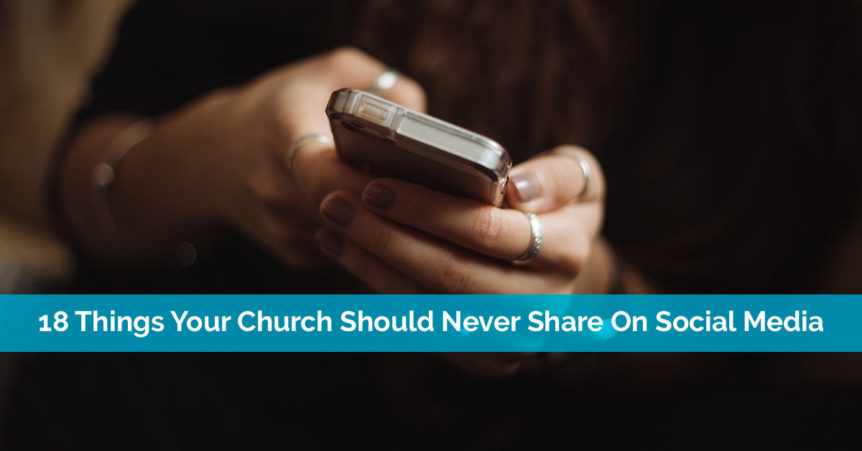You’ve probably read numerous posts about how to make social media work for your church. But, it’s important to know what you should never share on social media.
Sadly, one wrong post could hurt the reputation of your church, even if you didn’t mean anything by it. The best approach is to just avoid the wrong types of posts.
The good news is, it’s easier than you might think to learn what not to share. In most cases, it’s similar to knowing what not to post on your own personal page.
1. Any Type Of Chainletter
Chainletters have been around long before anyone even knew what a computer or the Internet even was. However, it’s much easier to spread them faster thanks to the Internet and social media.
One of the top things your church should never share on social media is any form of chainletter, including Christian ones. You’ve more than likely seen them floating around. They often say something like “Share if you love Jesus” or “Share if you’re a true Christian.”
Sometimes, they’ll promise blessings if you share immediately. Or, they try to guilt you into sharing by implying if you don’t share, you don’t really believe.
That’s exactly what your church shouldn’t share them. They’re manipulative and having nothing to do with faith. They’re just silly posts that mean nothing, but could hurt your church’s reputation. It’s much better to just share something inspirational or a daily devotional over this.
2. Only Visit Our Church Posts
Please don’t misread this one. You should definitely share posts on Facebook and other social media channels that invite people to visit your church. However, this shouldn’t be the only type of post you share.
A once a week invitation is usually sufficient. Of course, sharing a few reminders about upcoming events is perfectly fine.

The problem comes when you bombard followers with a slew of “Visit our church” posts and nothing else. At this point, you’re not offering any value. Instead of continuing to follow your church, most people will just unfollow your profile and opt for a church that shares more engaging content.
Remember, many followers may not even live in your community. Add more types of posts to ensure your social media account is engaging for everyone.
3. Political Opinions
You know how you’re not supposed to talk about politics on a first date? The same holds true for your church and social media. Politics is one of the top things your church should never share on social media.
Politics really don’t belong on your church’s social media accounts or website. The more vocal you are about politics, the more you alienate those who may not share the same views. After all, the goal is to reach a wider audience, not push people away.
Plus, people are already sick of constant political posts and opinions from friends, family and strangers. Make your church’s social media account a safe haven where politics aren’t allowed.
4. Uninformed Opinions
In the same vein as politics, never rant about issues on your church’s social media account. Sometimes, you see a story and it’s infuriating or you instantly believe you have the right opinion.
However, you may not have the whole story just yet. Jumping on the bandwagon as a way to teach a lesson doesn’t always work so well when it turns out there’s much more to the story.
Take a moment to truly think about whatever it is you want to talk about. If it’s more opinion than fact, it’s probably best to skip it. This is especially true if you’re not 100% certain that your sources are factual and unbiased. An uninformed opinion can quickly give your church a highly judgmental reputation and people don’t like that.
5. The Latest Trends
Trends are a great thing and a wonderful opportunity for brands to get noticed. However, your church doesn’t always need to jump on the latest trends, especially when they’re not relevant to your church in any way.
It’s the same effect as when your grandparents try to use the hippest new phrase, but mangle it terribly. You don’t have to use trending hashtags or talk about the latest fashion. Unless it’s relevant to your church and your church’s goals, it’s better to skip it.
While some churches can pull off the cool, trendy vibe, it typically just backfires for most churches. In the end, you drive people away who just see your church as trying too hard instead of being authentic.
6. Pictures You Don’t Have Rights To
Legally, you can’t post pictures you don’t have the rights to. Not only does it violate the rights of the owner, but your church could be banned from the social media platform.
Copyright-free images are always appropriate. If you’re posting a photo of a large gathering at your church, that’s okay too. However, if you’re posting images from other websites and sources that don’t provide a license for use or you have to pay to use the image, don’t use it unless you get permission or pay for it.
Also, never post photos of individuals at your church, especially children, without permission. In the case of kids, get parental consent. Many parents don’t want their kids’ faces posted all over social media, even if it is to help the church.
7. Controversial Memes
One of the top things your church should never share on social media is controversial memes. While members may share these, they’re not appropriate on your church’s page or church leaders’ pages.

Memes, in general, aren’t a bad thing. There are even plenty of Christian memes to help share a message or add some humor to someone’s day. However, other memes should never have existed and just result in anger and debate.
Plus, if you don’t fully understand a meme’s message or intent, you could find your church accidentally taking sides in a controversial debate. No one wants that to happen.
8. Skip Outrage
Outrage posts are similar to the fire and brimstone preaching style, which very few people actually like or respond to. Instead of getting your point across, you’ll likely just see a drop in followers.
These are knee-jerk reaction types of posts. You know, the kind that actually get some people fired or even banned from social media.
You’re always entitled to feel outraged, but don’t put it on your church’s social media page. No one really wants to engage with an angry church. Have a more welcoming personality to your page and you’ll fare much better.
9. Anything NSFW
This one should be obvious, but it’s still worth mentioning. Anything NSFW (not safe for work) is something you should never share on social media.
First of all, your church’s page should always be family friendly. Posts that include foul language, nudity, graphic violence or hate speech are never appropriate for your church’s social media pages.
Even if you precede a post with NSFW, you still shouldn’t post it. If you wouldn’t want small children to see it, don’t post it.
10. Anything Bashing Members
This most often happens when volunteers are managing your social media accounts. While there’s nothing wrong with this, always monitor what’s going on to ensure members aren’t bashing each other.
Trying to shame another member for not tithing enough or skipping a few Sundays isn’t right. This is a quick way to show potential visitors that your church is judgmental and not friendly at all.
If members have any issues with each other, ask them to settle it offline. After all, you don’t even want your church tagged in their posts.
The same holds true with church staff. If there are any disagreements, they should be settled off of social media. Remind everyone that being petty on social media can ruin a church’s reputation.
11. Comparisons To Other Christians
Comparing yourself to others is never a good idea. It’s fine to have role models, but you should always encourage your members and social media followers to be true to themselves and their faith.
There’s no benefit in comparing yourself to other Christians. So, avoid sharing comparisons on social media. You also want to avoid comparing the unchurched and non-Christians to devoted Christians.

Anytime you start making comparisons to try and guilt someone into acting or feeling a certain way, it comes off as bullying.
Show that your church is welcoming to all by avoiding posting unnecessary comparisons.
12. The Wrong Emoji
No matter how well-intentioned, the wrong emoji is never good for your church. Emojis are one of those things you should never share on social media unless you’re certain about what they mean.
Don’t just rely on surface meanings either. After all, an eggplant seems innocent enough, right? But, it’s often used to stand for something highly inappropriate for churches to post about.
If you’re not sure, use Emojipedia to search for meanings. The site provides the standard meaning and hidden meaning, if it has a second meaning.
You can also ask teens and young adults in your church to help advise you.
13. Bragging Without Humility
Churches should always celebrate accomplishments. For instance, if you’re trying to raise money for a local family who’s been displaced due to a natural disaster, you may have a monetary goal. If you reach it, celebrate by thanking everyone who helped out and saying that you reached or exceeded your goal.
However, be humble. Bragging without humility makes your church seem arrogant. For instance, saying your church has three times as many members as a church several miles away isn’t appropriate. Instead, just say you have an active community.
14. Negative Responses To Comments
This should go without saying, but keep your responses on social media positive or neutral. Lashing out in anger or being nasty is just childish.
Take the high ground when someone decides to post a negative comment. Offer to settle an issue privately versus publicly. If they persist, you can try to work things out, but be careful. Don’t let anyone bait your church into saying something you’ll regret.
For people posting inappropriate comments designed specifically to harass your church and/or followers, ban them from interacting on your account. This is highly encouraged to keep your church’s social media community a positive and uplifting one.
15. Sharing Without Verifying
By now, everyone knows that fake news exists. In fact, social media is the king of spreading fake news.
The problem is people are eager to share without verifying the information first. This includes news stories, supposedly true stories, memes, outrage posts and much more.
No matter how real something seems to be, verify it first. Passing on posts that aren’t real can hurt your church. Remember, if you’re sharing it, your members are probably sharing it from you too. You don’t want someone’s first impression of your church to be a fake news post, even if it has gone viral.

In addition to fake news, avoid clickbait posts. Often times, you’ll see a headline and eagerly share. Unless you verify it’s not a spam post with a clickbait title, never share on social media.
Consider using Snopes and Fact Check’s guide to help verify what you’re sharing.
16. Insensitive Comments
Much like negative responses, try to avoid posting insensitive comments. For instance, posting something like “the best thing you could ever do is be a parent” may turn people away you can’t physically have children. This is especially true if you know one of your members recently had a miscarriage.
While you won’t always please everyone, just skip highly insensitive comments that come off as more of an opinion than fact.
17. Anything Encouraging Negative Debates
You want people to interact on your social media channels, but negative debates never work out. If you think something could turn into a nasty debate, skip it. For instance, you don’t want to post something like “If a person does XYZ, should they go to hell?”
As you could imagine, this could take a terrible turn quickly. Instead, keep things more positive or neutral and moderate comments to keep things from escalating.
18. Downing Other Faiths
Finally, downing other faiths is something you should never share on social media. If someone is following your account, it’s because they want to explore Christianity. They’re not interested in hearing why another faith is wrong.
Instead, focus on your own faith and spreading the word.
In addition to social media, make sure your church has an active website. If you need a church website or a website overall, contact us today.




